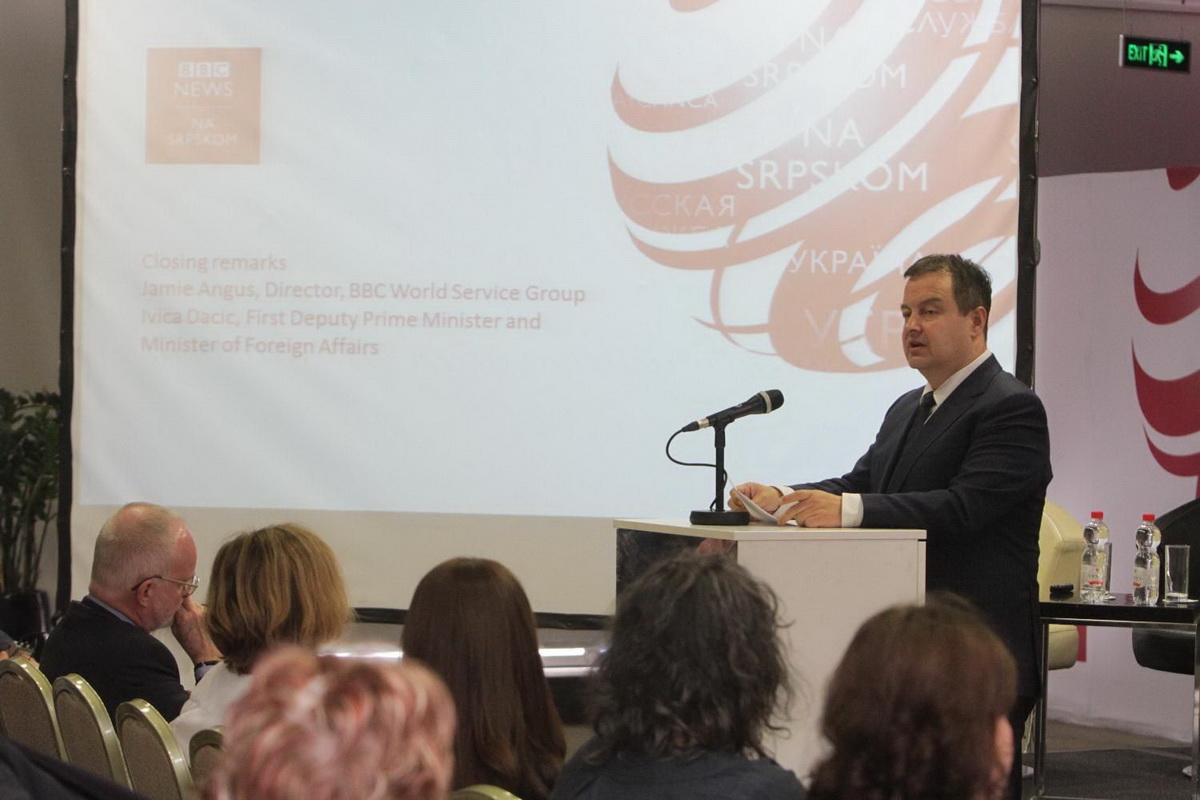



| Tuesday, 24 April 2018. | |
| Minister Dacic at the Conference “The Future of News Portals in the Western Balkans” | |
| + larger fontnormal font- Smaller font |
 Statement by FDPM/MFA I. Dačić Statement by FDPM/MFA I. Dačićat the Conference "The Future of News Portals in the Western Balkans": Ladies and gentlemen, Dear colleagues, It is my great pleasure – as First Deputy Prime Minister and Minister of Foreign Affairs of the Republic of Serbia, as well as a graduate journalist – to address this meeting devoted to the future of information. Although the digital media in Serbia have not as yet taken lead from the traditional media, there is no doubt that we are heading in that direction. For this particular reason, I consider valuable the experiences of those who have overtaken us along that road, such as Great Britain, enabling us to learn from their successes and even more from the challenges they face. I believe that our today's meeting has been helpful especially in this respect, i.e. that it has offered you an opportunity to examine how to develop digital information models, while avoiding Scylla and Charybdis encountered by the pioneers in this industry, including the BBC, when they went digital, and to base your further development on the practices that have proven to be the most beneficial and most effective. The challenges posed to us by digitalization are an opportunity for progress, a roadmap prompting us to upgrade and surmount the existing models. Diplomacy is apparently one of the best examples in that respect. In an information era, digitalization may have brought about the biggest change particularly in diplomacy – journalism has created a new platform and new modalities for placing its contents, whereas diplomacy has almost entirely turned around its approach to the field of information. Traditional diplomacy is considered to be a highly hermetic discipline, the line of work in which results are made public only after they have come to fruition either in the form of an agreement reached or a treaty signed. Diplomats, who are otherwise not very keen to appear in the media in the first place unless to talk about the fruits of their efforts that take months and sometimes years, have today found themselves in a situation to be able to create their own arguments in the digital media. We have been witness to an ever greater presence of foreign ministries and diplomatic envoys in the digital landscape, more than was the case in the traditional media. I am glad because of it, even though I am not certain that all my colleagues at the Ministry would agree with me - they are used to working tirelessly and only sharing the fruits of their labour once there was a tangible result to present. I believe that they as well as the efforts we invest together and significant results we achieve deserve greater recognition, but that the Serbian citizens, at the same time, deserve to know that we work dedicatedly to protect their interests. The digital context provides us with an opportunity not to be dependent on interpretation from the outside, but to be able to present our work and arguments ourselves. That we have taken this new challenge seriously is reflected in a number of digital diplomacy workshops we organized for our staff in cooperation with the UK Foreign and Commonwealth Office. It is in the "democratization" of information that digitalization has brought about, where each individual shapes his/her own arguments, that I see ways and means to help further development of society, in addition to the challenges you discussed today. The Ministry of Foreign Affairs, and not only this one but each and every state institution worldwide, needs to set certain standards and stick to them, being wary of not entering into competition with the media, and instead being their reliable source and partner of integrity. What I see as our task is to assist the professional media in fighting the dissonant rumours spread in the digital media by providing them with verified information in a timely manner. By participating in the public domain, we are also creating it to an extent, thus bearing our share of responsibility for the quality of the debate on digital platforms - a modern-day equivalent to the ancient Greek agora. Of course, the same goes to media outlets. Greater freedom implies greater responsibility - which is something all of us presenting a certain content need to adhere to, both state institutions and the media. This is the only way to build a free and responsible society we aspire to. I hope that today's journey through the digital domain was constructive. As we reflect upon the future, it could prove useful to recall the past as well - namely, the founder of the BBC, Mr. John Reith noted that the goal of the public broadcasting service was to "educate, inform and entertain". And while platforms may change, the principles, if well-established, remain as time goes by. Ladies and gentlemen, thank you for your attention and I wish us the best of luck in our cooperation. |